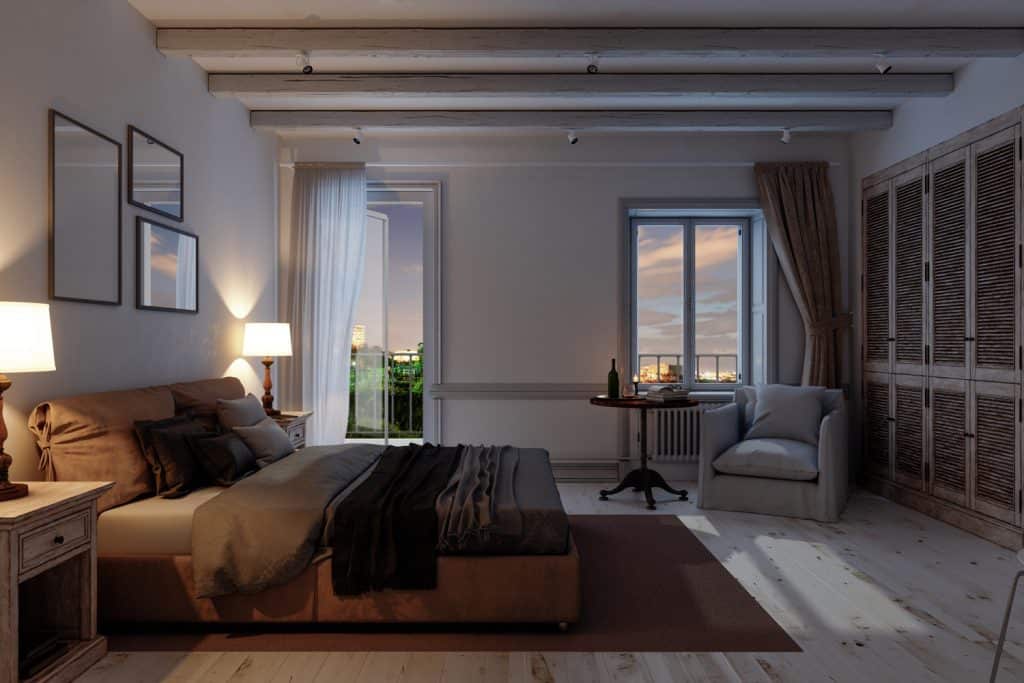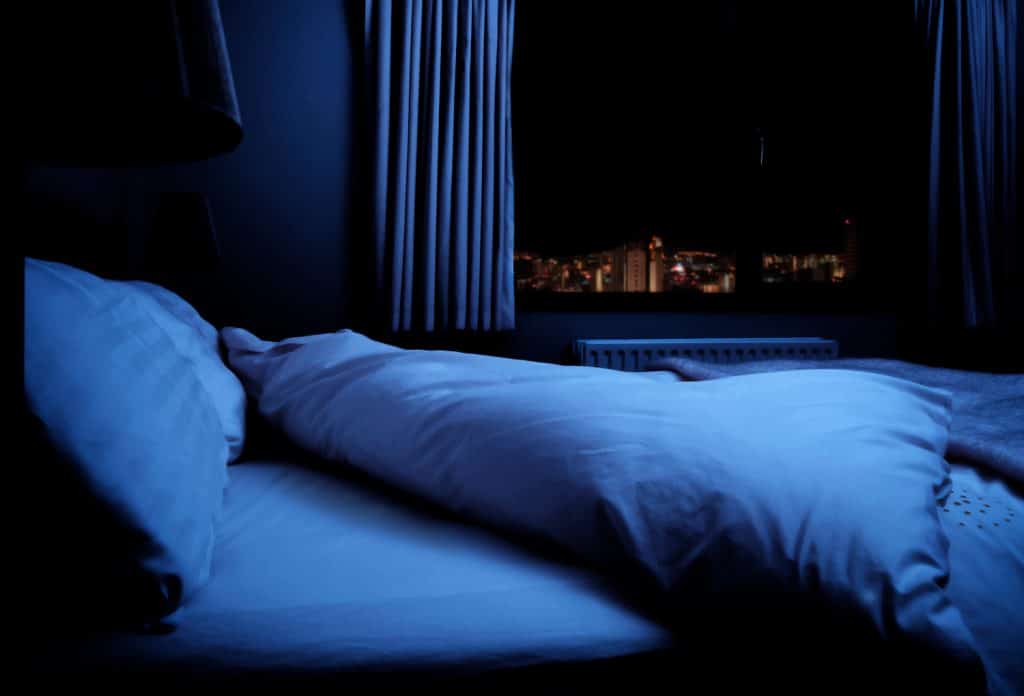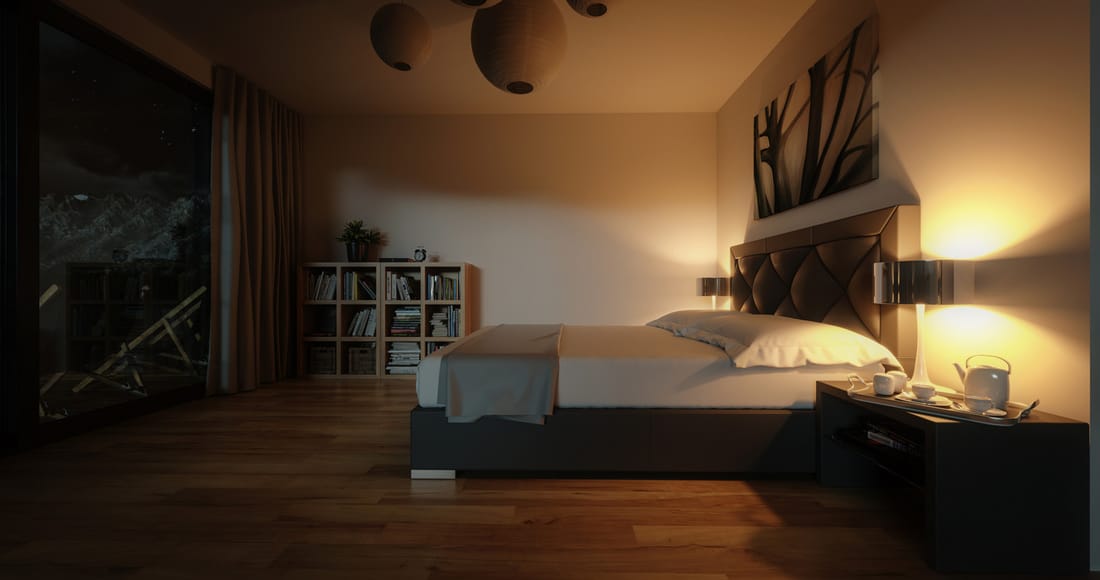Stuffy Bedroom At Night
Stuffy Bedroom At Night
Staying comfortable throughout the night and getting good sleep can be a tricky problem. One of the most significant factors that go into that is your bedroom getting uncomfortably hot. Unfortunately, this is a common problem that can cause some major headaches. We have researched all about why bedrooms might get too hot and how to fix that so you can get the restoring sleep that everyone craves!
There are several reasons why your bedroom might get too hot at night. Each possible cause of the problem also comes with its unique solutions. Sleeping in the heat can have several negative effects on your body. Here are the most common reasons why this might be happening in your bedroom.
- The bedroom's location
- How much sunlight hits your bedroom
- If your air conditioning system isn't working properly
- Your A/C isn't big enough
- Thermostat location
- Insulation issues
- Inefficient windows
- Your bedding
We all know how hard it is to function after a lousy night of sleep. That's why it's so important to have all of the information surrounding this subject if it's lowering your quality of rest. Continue reading below to learn about each cause for a hot bedroom in full detail and how to fix the issue!
![Modern Bedroom Interior At Night With Neon Light. Messy Bed, Clothes In Closet, Armchairs And Floor Lamp, Why Does My Bedroom Get So Hot At Night? [And What To Do About It]](https://homedecorbliss.com/wp-content/uploads/2021/08/Why-Does-My-Bedroom-Get-So-Hot-At-Night-And-What-To-Do-About-It.png)
Reasons Why Your Bedroom Is Too Hot And How To Fix Them
A lot more goes into rising temperatures and regulating them in a home than you might think. It could be because of one of the following issues or even a combination of several of them. Each heat problem, and its solution, is unique and based on your home and even on you!
Is It Bad To Sleep In A Really Hot Room?
The main negative effect of sleeping in the heat is that it disrupts your sleep. The effect of thermal environment on sleep and circadian rhythm explains in more detail how hot temperatures hinder your ability to get effective sleep.
Sleeping in the heat can do some actual harm. It can dehydrate you and may even harm your thinking ability and memory.
It will also cause you to sweat, leading to many different types of rashes, bacteria, and infections if you have open wounds. Not to mention if you're already sick, then sleeping in the heat will affect your body's temperature and make things worse.
1. The Bedroom's Location
If you didn't already know, heat rises. This means that if your bedroom is on the top floor of your home, or an apartment building, then a lot of the heat from everything below rises and gets trapped in it. This is why basements are always so cool, and attics are usually blistering.
You can't change the location of your bedroom, but if you have multiple levels, you can limit how much heat is below it. One fix for this issue is to change your thermostat so that the overall temperature on the main level is cooler at night.
If you're in an apartment building and you can't do that, then you might need to find other ways to cope. This might include a bedroom fan, less heavy bedding, and even cooler outfits that you sleep in.
2. How Much Sunlight Hits Your Bedroom

If you have an east-facing bedroom, then that intense morning and afternoon sun is hitting it directly. If you have several windows in your room, then between those and the heat from walls, it can create a greenhouse effect in your room. This effect can last well into the night as the heat lingers.
The best way to combat this is by blocking out as much light and heat as possible while the sun is at its strongest. Purchase good blinds or light-blocking curtains.
Getting both would help even more! This will do a lot to help your room take in less heat during the day. If the heat can't enter your room, then it can't get trapped there at night!

Click here to shop for light-blocking shades on Amazon.

Look at blackout curtains here on Amazon.
3. If Your Air Conditioning System Isn't Working Properly
Air conditioning system malfunctions go well beyond the actual appliance breaking down. You might also not have enough ductwork in your home.
Maybe you need two or three vents for the size of your bedroom, and you only have one. It's also possible for that ductwork to degrade and leak out the cool air before it can get to your room.
It could even be as simple as needing to change your air filter because it's too dirty. The point is, just because the appliance itself isn't broken, that doesn't mean that the system that's attached to it isn't.
To resolve this issue, you first have to troubleshoot and find out the specific problem. Whether that is just changing the filter or hiring a professional to check the appliance and all of the ductwork. Unfortunately, you may end up having to get a lot of work done to fix this problem.
4. Your A/C Isn't Big Enough

It's possible for the size of the air conditioner installed in your home not to be powerful enough to cool all of it properly. This might happen because the person who installed it didn't know how big a unit to purchase. It's also possible that the home was added onto, but the A/C wasn't updated to match the new square footage.
Whatever the reason, if the capabilities of the appliance don't match the size of the space, then the upstairs bedrooms are going to get hotter.
The most effective way to fix this issue is to contact a professional and have them evaluate your system. They might recommend that you need a new and more powerful A/C, or hopefully, it just needs maintenance.
If they recommend a new system and don't want that, you may need to add one or several small single-room air conditioners to get through the hotter months.

Check out one-room air conditioners on Amazon.
5. Thermostat Location
The thermostat works by changing the temperature in your home to match the temperature that you set it to. Or does it? In reality, it changes the temperature surrounding the thermostat to match what you set it to.
This means that if it is on an exterior facing wall, which will get warmer from the direct sun, it will not be working efficiently. The location might also not correctly represent some areas of the home, like bedrooms, which can lead to this issue.
You want to ensure that the thermostat is located on an interior wall near where the home's occupants spend most of their time. Don't place it near areas where the temperature can change due to other factors like the kitchen, laundry room, or direct sunlight.
To move the thermostat, you can attempt it independently if you know what you're doing, otherwise hire a professional.
6. Insulation Issues
Insulation does a ton to help regulate a home's temperature and protect from the elements. However, it can cause problems too. If heat enters a bedroom from below or through windows, the insulation can help trap the heat there during the night.
Having too little insulation can also cause a problem. It can let in heat from the outside or even from above through the attic.
Depending on your insulation issue, you could have more of it installed. But if the problem is that it's trapping the heat in your bedroom, then you don't want to remove any of the insulation.
The best solution would be to prevent heat from entering the bedroom or release it before you go to sleep. You can block out your windows during the day to stop heat from coming in and use a fan and an open window after the sun goes down to try and vent to heat out.
7. Inefficient Windows
Windows also play a prominent role in temperature regulation in a building. Old windows can not only let in more unwanted heat but also let cold air escape. This can lead to heat entering and being trapped in a room while any cool air inside is leaving through old and cracked seals around the windows.
The easiest way to try and fix this issue is to check the caulking around the bedroom's windows. If it looks like it might be cracking or has gaps in it, then you can re-caulk around the windows.
When that is done, and the problem persists, it's probably time to look into new windows. If that's not an option, then you can use the short-term solutions mentioned above to help.

Shop for window caulk here on Amazon.
8. Your Bedding

If the excess heat is mild, then swapping out your bedding might make a difference. That thick comforter may be cozy, but it's probably made to trap all of your body heat under it. This is great in the winter but not in the summer.
Look into temperature regulating bedding options such as comforters, mattress toppers, and sheets. Changing your bedding might take the edge off from the heat enough to not make it an issue anymore!

Click here to shop for cooling sheets on Amazon.

Start shopping for a cooling mattress topper on Amazon.
Why Is My Bedroom So Stuffy?

A stuffy bedroom results from heat and humidity being trapped in the room and there no being enough airflow. To fix this issue, you first have to look through the possible causes for it above. Once the problem is identified, you can decide on the best solution for your specific situation.
Does A Fan Cool Down A Room?
Fans don't actually change the temperature of the room at all. They move around the air that's already in the room. However, having a fan can cool you down because it redirects cold air from other parts of the room and puts them directly on you.

Click here to start shopping for fans on Amazon.
Is It Bad To Sleep With A Fan Blowing On You?
There are pros and cons, and they depend on how the fan is directing air onto you. If it's close and strong, it can dry out your face, mouth, and sinuses.
Fans might also redirect pollen and allergens towards you, so you inhale them while you sleep, and it can increase adverse side effects associated with allergies. The directed air can also dry out your eyes and your skin.
Sleeping with a fan on can also cool you, circulate the air in the room to help prevent stuffiness, and provide soothing white noise. Each of the negatives can depend on your individual situation, and they each have their own set of solutions. You have to weigh the positives against the possible negatives for yourself.
How Do I Increase The Airflow In A Room?
The best ways are some type of a fan, opening a window, or adding vents to your room. Depending on your airflow situation, one of these might be more effective and plausible than another.
Finishing Up
![Modern Bedroom Interior At Night With Neon Light. Messy Bed, Clothes In Closet, Armchairs And Floor Lamp, Why Does My Bedroom Get So Hot At Night? [And What To Do About It]](https://homedecorbliss.com/wp-content/uploads/2021/08/Modern-Bedroom-Interior-At-Night-With-Neon-Light.-Messy-Bed-Clothes-In-Closet-Armchairs-And-Floor-Lamp.jpg)
There are many causes for a bedroom being too hot at night, from a poor HVAC system to how heat enters your room and how it gets stuck there. Each issue has its own solution, and there are also smaller ways to cope, such as fans, that can help until a long-term solution can be applied.
Sleeping in the heat can have many negative side effects. Hopefully, with all of this new knowledge, you can deal with your hot bedroom quickly and get back to a great night's sleep!
For more bedroom know-how, click on the links below!
Why Does My Bedroom Get So Dusty?
Bedroom Door Won't Stay Open – What To Do.
Source: https://homedecorbliss.com/why-bedroom-gets-hot-at-night/


Tidak ada komentar:
Tulis komentar